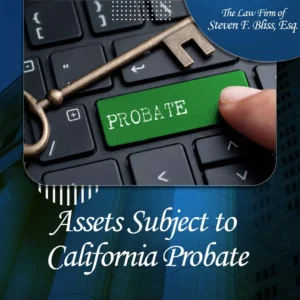What Are The Assets Not Subject To California Probate?
Assets Subject to California Probate?
Listen to this Article on:
Determining whether an estate has assets that are not subject to probate can save you time and money.
Determining whether an estate has assets that are not subject to probate can save you time and money. Here are several types of assets that qualify as non-probate assets. If you’ve been named the administrator or executor of an estate, you’ll need to inventory property and possessions and determine what’s subject to probate and what isn’t. Only the assets considered “probate property” should be listed on forms filed with the probate court.

You may find yourself looking for guidance about dealing with all of the “stuff,” all of the estate assets following a death. Sometimes it is easy to deal with the small things. Your daughter gets dad’s guitar, and your son gets dad’s carved mahogany bar, done and done. But who gets the lake house, and who takes over the stock portfolio? How do I change the legal title to these assets so I can manage them as trustee or executor? If these items are in a trust, the answers should all be in a properly prepared trust document. It should not be necessary to involve the California Superior Court in the trust estate administration.
But if dad died without a trust, or he died with assets not held in trust, and the value of his probate estate was over $100,000, you may need to start a probate proceeding to receive court authority to manage the probate estate.
How do you value dad’s estate? Usually, the following assets are considered part of the decedent’s probate estate and are subject to the probate process:
Please Help Us Spread The Word By Giving Us a 5 Star Rating on This Article
Free Initial Consultation with
Steven F. Bliss Esq.

★ ★ ★ ★ ★

All of the decedent’s separate property, generally assets in the deceased person’s name alone acquired outside of marriage or inherited during the marriage;
One-half of the decedent’s community property (generally, property acquired during marriage);
The deceased person’s portion or share of an asset where the asset is titled as tenants in common with others;
ASSETS NOT SUBJECT TO CALIFORNIA PROBATE
However, not all assets under the decedent’s control are subject to probate at death.
California law provides that probate of an estate is not necessary if the total value at the time of death of the assets, which are subject to probate, does not exceed the sum of $166,250 (as of 2020). There is a simplified procedure for the transfer of these assets. The $166,250 figure does not include vehicles and certain other assets.
Furthermore, the following assets are not subject to the probate process:
Assets held in a revocable (living) trust;
Assets held in an irrevocable trust;
Assets adequately transferred out of the decedent’s estate before death (i.e., lifetime gifts, GRATs, QPRTs, etc.);
Assets held in joint tenancy with another person or persons;
Assets such as life insurance and I.R.A. benefits, where a beneficiary is named;
Assets held in the deceased person’s name as “trustee” for the benefit of another;
“Payable On Death” (P.O.D.) or “transfer on death” (T.O.D.) accounts;
Assets are passed to the surviving spouse. An exception to this can arise if an institution, like a bank or a title company, refuses to transfer control of assets to the surviving spouse without The probate court having issued letters of Testamentary or Letters of Administration. In the right circumstance, California has a simplified procedure referred to as a “spousal confirmation proceeding” that can avoid the necessity of an entire probate proceeding. Generally, a petition is filed with the court, notice is given to certain parties, and if there are no objections, the court orders the transfer of assets.
What Are Probate Assets?
In most states, the personal representative must list all probate assets with their values and file the list with the probate court. You can also think of this as a list of assets for the will. Some investments, like bank accounts, are easy to put a value on. Others, like antiques, jewelry, and collectibles, may require an appraisal.
Probate assets include:
Real estate, vehicles, and other titled assets are owned solely by the deceased person or as a tenant in common with someone else. Tenants in common don’t have survivorship rights. The owners can bequeath their share of the property to someone else.
Personal possessions. Household items go through probate, clothing, jewelry, and collections. The inventory should include the decedent’s personal belongings that remain after death.
Probate isn’t required in some states if the estate’s value is below a specific dollar amount. Some states also have a simplified probate procedure for small estates or when all property is transferred to a surviving spouse. But even when probate isn’t required, going through the process can have advantages.
Sorting through property and accounts can be tedious, and it’s not always easy to tell what’s subject to probate and what isn’t. It’s best to get legal advice if you have questions or aren’t sure what property to list with the probate court.
